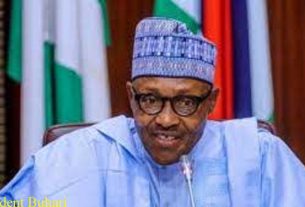Thirty-Seven years after he overthrew the elected governor of the defunct Bendel State, Prof. Ambrose Mofolorunsho Alli, in a coup and ordered his trial over alleged corruption, President Muhammadu Buhari yesterday rewrote his history as he granted the deceased a posthumous state pardon.
The pardon was also extended to Chief Anthony Enahoro, Lt.-Col. Moses Effiong (rtd), Major E.J. Olanrewaju and Ajayi Olusola Babalola.
Some 2,600 inmates of correctional centres nationwide were also included in the amnesty.
Some analysts might view the pardon, especially of Alli and Enahoro, as a distortion of history, an insult to people of the southern region and a distraction. Some could also accuse the president of attempting to score a cheap political point.
Reacting, a former presidential aspirant, Omoyele Sowore said: “We should be fighting differently. Good people are losing out while bad political actors are getting rewarded for their bad behaviours! Imagine the regime of Buhari ‘pardoning’ Ambrose Alli, a democratically elected governor he illegally overthrew in 1983?”
Ambrose Alli was a Nigerian medical professor who served as the first civilian governor of the defunct Bendel State between 1979 and 1983. After the military government of the then Major-General Muhammadu Buhari took power in 1983, the late Ambrose Alli was sentenced to 100 years in prison by a military tribunal for allegedly misappropriating N983,000 in funds for a road project. He was reportedly freed later when the Esama of Benin, Chief Gabriel Igbinedion, paid a fine to the government.
Chief Anthony Eromosele Enahoro was one of Nigeria’s foremost anti-colonial and pro-democracy activists. Enahoro, who was born 22 July 1923, and died 15 December 2010, aged 87, was one of the last survivors of the independence generation of Nigerian politicians.
In 1953, he became the first to move the motion for Nigeria’s independence. He has been regarded by academics and many Nigerians as a most outstanding hero of Nigeria’s independence and the father of the Nigeria State.
Enahoro was detained alongside other Action Group members during the 1962 crisis in the old Western region, having been accused of treason during the alleged coup trial of his leader and soul mate, the legendary Chief Obafemi Awolowo.
He escaped via Ghana to the United Kingdom in 1963. Nigeria requested Enahoro’s extradition under the 1881 Fugitive Offenders Act, preventing his application for political asylum. He was extradited from the U.K. and imprisoned for treason. The Military Government released him in 1966.
He was renowned as the parliamentarian who moved the first motion envisaging independence in 1953. Post-independence, he was imprisoned for “treasonable felony”.
After his release, he had a spell as one of the ablest advocates of Nigerian unity during the civil war (1967-70).
Enahoro, who became regarded as an elder statesman, was once one of the best-known Nigerians in Britain. He was the “fugitive offender” who triggered days of debate in the House of Commons in 1963 as he battled against extradition.
He was born in Uromi, in the midwest of Nigeria. He was educated in Uromi and Owo, and then – during the Second World War – at the elite King’s college in Lagos. It was a time of growing change and simmering nationalist politics. Although his father wanted him to be a lawyer or a civil servant, he chose journalism, in part because it went hand in hand with politics.
He attached himself in 1944 to Nigeria’s pre-eminent politician-journalist, Nnamdi Azikiwe, who sent the 21-year-old Enahoro to edit the Southern Nigerian Defender in Warri. He became editor of the Daily Comet in Lagos (1945-49) and associate editor of West African Pilot (1950-52).
Enahoro was prominent in politics at a time of rapid change. He was twice jailed for sedition by the colonial government, for an article mocking a former governor, and then for a speech allegedly inciting Nigerian troops serving in the British army. The British marked him as a firebrand, but even as he was jailed for a third time, he was beginning to reassess his position.
After having established his own short-lived newspaper, the Daily Star, in Sapele in 1951, he moved into the orbit of the Action Group (AG), the newly formed political party of Obafemi Awolowo. Enahoro was attracted by Awolowo’s rationality and coherent political programme.
He was rewarded with political advancement, becoming a member of the Federal House of Assembly. It was there, in February 1953, that he moved the historic motion for self-rule by 1956. Although it now appears a modest move, and was rejected because of the majority vote of northern members, it pressurised the British into political advance, and shook the north into accepting a faster pace towards independence.
He was elected a member of the Western House of Assembly, and in 1954 became minister of home affairs in Awolowo’s government. In this period Enahoro travelled frequently, especially to London in the delegation to the series of constitutional conferences, which brought Nigeria to independence in 1960.
By then, with Awolowo now leader of opposition to the ruling coalition of the northern leaders and Azikiwe, Enahoro was back in the Federal House as a key player. By 1962 the AG was in crisis, with a split party, and a state of emergency in the west. Party leaders found themselves accused of a coup plot, and, threatened with detention, Enahoro escaped via Ghana to London.
Nigeria requested Enahoro’s extradition under the 1881 Fugitive Offenders Act, preventing his application for political asylum. Early in 1963, the new leader of the Labour party, Harold Wilson, detected the embarrassment caused by Enahoro’s arrest and imprisonment. Labour went on the attack in the Commons, with support from some Tories, backed by a media furore.
“The Enahoro affair” became an issue of human rights versus the government’s pusillanimous wish not to offend Nigeria, and put the Tory prime minister, Harold Macmillan, and his home secretary, Henry Brooke, in a difficult position.
Enahoro was extradited, tried for treasonable felony and sentenced to 15 years’ imprisonment, reduced on appeal. In his autobiography, Fugitive Offender (1965), he claimed that the trial was based on slender and doubtful evidence, and in the long run added to his political reputation.
After his release in 1966, he played an important part in the ensuing constitutional discussions. The following year, he was made commissioner for information and labour in the administration of General Yakubu Gowon. He played a key part in the international public relations of the federal government during the civil war, calling on his quietly effective style of reasoning and his skills as a communicator.
After the war, he held down wage increases in the oil boom and balanced media freedom with security needs. He lost his job in the coup of July 1975. He was later involved with the ruling party in the ill-fated Second Republic government (1979-83).
He became chairman of the National Democratic Coalition that rallied the groups opposing General Sani Abacha’s dictatorship in the 90s. He was chair of his own party, the Movement for National Reformation, and of the Pro-National Conference Organisation, but his real role had become one of a revered national icon.
He is survived by his wife, Helen, and five children: Kenneth, Eugene, Bella, Victor and Gabriel.
The Minister of Interior, Rauf Aregbesola, who announced the amnesty in Abuja, said 70 of the inmates were from the Kuje maximum custodial centre. The tally includes 41 federal prisoners and 29 Federal Capital Territory (FCT) inmates. He said 2,600 prisoners had been given the presidential reprieve across the federation.
Earlier, the Attorney General of the Federation and Minister of Justice, Abubakar Malami (SAN), while kicking off the 2020 presidential pardon and clemency to convicts and inmates at the facility, had stated that the exercise was part of measures by the Federal Government to decongest the prisons in the wake of the COVID-19 pandemic.
He explained that the entire process began in August 2018 when the Presidential Advisory Committee on Prerogative of Mercy (PACPM) was inaugurated to advise the Nigerian leader on pardoning deserving inmates and ex-convicts in line with Section 175 of the1999 Constitution (as amended).
To arrive at the list, the minister said the committee adopted interviews, observations, consultations and relevant documents from every correctional centre in the country.
Owing to the urgency of the time, Malami added that Buhari had requested appropriate authorities to visit all facilities in the states to identify and release deserving inmates.
The minister encouraged the payment of fines for convicts of lesser offences, warning beneficiaries to desist henceforth from crimes. The AGF also urged communities to reintegrate the pardoned with love to make them more useful to the society.He stressed the need to identify new ways of reducing the number of inmates in the custodial centres to contain the spread of the novel coronavirus.
Aregbesola, who represented the president at the event, said the welfare of the citizens remained a top priority of government, including the decongestion of the prisons. He harped on reorientation from the punitive concept of imprisonment to correction and reformation where prisoners would be given an opportunity to reflect, regret, repent, be transformed, be renewed and energised to begin a new and productive life as honourable and law-abiding members of the society.
According to the former Osun State governor, the 250 facilities that currently house over 74,000 inmates nationwide are grossly inadequate, promising that the Buhari administration would address the challenge.
The Nigerian Correctional Service, he added, was making serious efforts to prevent the introduction of the virus in these centres through improved hygiene, suspension of social visits and extra-screening of new inmates, among others.
The Guardian with additional report from The Guardian of London





